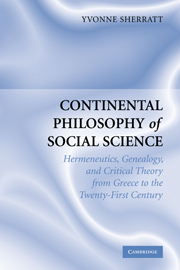Book contents
- Frontmatter
- Contents
- Preface
- Continental Philosophy of Social Science
- Introduction
- PART I THE TRADITION OF HERMENEUTICS
- Introduction
- 1 Ancient Hermeneutics
- 2 Biblical Hermeneutics
- 3 German Philosophical Hermeneutics: Enlightenment and Romanticism
- 4 German Philosophical Hermeneutics: Phenomenology and Existentialism
- 5 Continental Philosophical Hermeneutics Post War
- PART II THE TRADITION OF GENEALOGY
- PART III CRITICAL THEORY
- Conclusion
- Bibliography
- Index
3 - German Philosophical Hermeneutics: Enlightenment and Romanticism
Published online by Cambridge University Press: 23 November 2009
- Frontmatter
- Contents
- Preface
- Continental Philosophy of Social Science
- Introduction
- PART I THE TRADITION OF HERMENEUTICS
- Introduction
- 1 Ancient Hermeneutics
- 2 Biblical Hermeneutics
- 3 German Philosophical Hermeneutics: Enlightenment and Romanticism
- 4 German Philosophical Hermeneutics: Phenomenology and Existentialism
- 5 Continental Philosophical Hermeneutics Post War
- PART II THE TRADITION OF GENEALOGY
- PART III CRITICAL THEORY
- Conclusion
- Bibliography
- Index
Summary
ENLIGHTENMENT AND ROMANTICISM
In moving on to assess the hermeneutic contribution of the dawning modern era, we are entering the realm of German philosophical hermeneutics. In spite of making a strong claim throughout our discussion thus far for the significance of earlier Ancient and Judeo-Christian interpretative practices, this is not in any sense meant to diminish the value of the German contribution. As Warnke, Mueller-Vollmer and Palmer have all so well told, this is undoubtedly a mighty tradition. My point is that this later tradition builds upon earlier humanist strands of thought. Ironically, a further point is that those humanist scholars with their distinguished accounts of Ancient Greco-Roman and Judeo-Christian hermeneutics, for instance, Copeland, Eden and so on, can in turn underplay the significance of the later German contribution.
Philosophical hermeneutics grew on the continent. It can be conceptualised as beginning roughly around Enlightenment and then developing through Romanticism to the twentieth century and beyond. Its main protagonists during the era of Enlightenment were Wolff and Chladenius. Throughout the Romantic period, Schleiermacher, von Humboldt, Droysen and Dilthey all carried the flame. Later, phenomenology and existentialism, with figures like Husserl and Heidegger, and the theologian Bultmann became key. Post-war hermeneutics of the twentieth century, meanwhile, has been dominated by Gadamer, with later thinkers like Ricoeur and Derrida initiating important developments and, of course, Habermas intercepting with influential debates.
- Type
- Chapter
- Information
- Continental Philosophy of Social Science , pp. 50 - 73Publisher: Cambridge University PressPrint publication year: 2005



